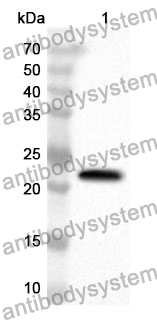Catalog No.
PHH01901
Species reactivity
Human
Host species
Rabbit
Isotype
IgG
Clonality
Polyclonal
Immunogen
E. coli - derived recombinant Human AGER (Ile91-Asp274).
Tested applications
ELISA: 1:4000-1:8000, IHC: 1:50-1:100, WB: 1:1000-1:4000
Target
Receptor for advanced glycosylation end products,Advanced glycosylation end product-specific receptor,AGER,RAGE
Purification
Purified by antigen affinity column.
Accession
Q15109
Applications
ELISA, IHC, WB
Form
Liquid
Storage buffer
0.01M PBS, pH 7.4, 50% Glycerol, 0.05% Proclin 300.
Stability and Storage
Use a manual defrost freezer and avoid repeated freeze thaw cycles. Store at 2 to 8°C for frequent use. Store at -20 to -80°C for twelve months from the date of receipt.
Sex Differences in Long COVID., PMID:39841477
2024 Update of the RECOVER-Adult Long COVID Research Index., PMID:39693079
An anti-RAGE chimeric antibody alleviates CCl4-induced liver fibrosis via RAGE/NF-kB pathway in mice., PMID:39657505
Fc-enhanced anti-CTLA-4 depletes tumor-infiltrating regulatory T cells to augment immune effects of androgen ablation in high-risk prostate cancer., PMID:39314954
Molecular dynamics simulation of the brain-isolated single-domain antibody/nanobody from camels through in vivo phage display screening., PMID:39290991
Extracellular NCOA4 is a mediator of septic death by activating the AGER-NFKB pathway., PMID:38916095
Insight into the Interplay of Gd-IgA1, HMGB1, RAGE and PCDH1 in IgA Vasculitis (IgAV)., PMID:38673968
Lupus autoantibodies initiate neuroinflammation sustained by continuous HMGB1:RAGE signaling and reversed by increased LAIR-1 expression., PMID:38448779
Neoadjuvant durvalumab plus radiation versus durvalumab alone in stages I-III non-small cell lung cancer: survival outcomes and molecular correlates of a randomized phase II trial., PMID:38114518
Specific serum autoantibodies predict the development and progression of Alzheimer's disease with high accuracy., PMID:37989443
HMGB1-RAGE axis contributes to myocardial ischemia/reperfusion injury via regulation of cardiomyocyte autophagy and apoptosis in diabetic mice., PMID:37768929
Human intestine and placenta exhibit tissue-specific expression of RAGE isoforms., PMID:37533998
Oxidised IL-33 drives COPD epithelial pathogenesis via ST2-independent RAGE/EGFR signalling complex., PMID:37442582
Evaluating the effect of measles and rubella mass vaccination campaigns on seroprevalence in India: a before-and-after cross-sectional household serosurvey in four districts, 2018-2020., PMID:36240831
LRG1 destabilizes tumor vessels and restricts immunotherapeutic potency., PMID:35590198
Soluble RAGE attenuates Ang II-induced arterial calcification via inhibiting AT1R-HMGB1-RAGE axis., PMID:35278873
Heparan sulfate-dependent RAGE oligomerization is indispensable for pathophysiological functions of RAGE., PMID:35137686
Generation, biochemical characterizations and validation of potent nanobodies derived from alpaca specific for human receptor of advanced glycation end product., PMID:34653677
High potency STING agonists engage unique myeloid pathways to reverse pancreatic cancer immune privilege., PMID:34341132
RAGE and αVβ3-integrin are essential for suPAR signaling in podocytes., PMID:34166766
SARS-CoV-2 proteins regulate inflammatory, thrombotic and diabetic responses in human arterial fibroblasts., PMID:33895357
HMGB1/RAGE/TLR4 axis and glutamate as novel targets for PCSK9 inhibitor in high fat cholesterol diet induced cognitive impairment and amyloidosis., PMID:33667517
Pretreatment of aged mice with retinoic acid supports alveolar regeneration via upregulation of reciprocal PDGFA signalling., PMID:33479039
Integrated Single-Cell RNA-Sequencing Analysis of Aquaporin 5-Expressing Mouse Lung Epithelial Cells Identifies GPRC5A as a Novel Validated Type I Cell Surface Marker., PMID:33187367
HMGB1 and its membrane receptors as therapeutic targets in an intravesical substance P-induced bladder pain syndrome mouse model., PMID:32222337
Integrated transcriptomic correlation network analysis identifies COPD molecular determinants., PMID:32099002
Autophagy-based unconventional secretion of HMGB1 by keratinocytes plays a pivotal role in psoriatic skin inflammation., PMID:32019420
Can the AGE/RAGE/ERK signalling pathway and the epithelial-to-mesenchymal transition interact in the pathogenesis of chronic rhinosinusitis with nasal polyps?, PMID:31988531
The Trp triad within the V-domain of the receptor for advanced glycation end products modulates folding, stability and ligand binding., PMID:31912881
Clinical Implications of Extracellular HMGA1 in Breast Cancer., PMID:31779212
TLR9 activation cooperates with T cell checkpoint blockade to regress poorly immunogenic melanoma., PMID:31771649
Discovery of IACS-8803 and IACS-8779, potent agonists of stimulator of interferon genes (STING) with robust systemic antitumor efficacy., PMID:31500996
Mumps outbreak and MMR IgG surveillance as a predictor for immunity in military trainees., PMID:31493948
Atorvastatin Blocks Advanced Glycation End Products Induced Reduction in Macrophage Cholesterol Efflux Mediated With ATP-Binding Cassette Transporters G 1., PMID:31378770
S100B Protein Stimulates Proliferation and Angiogenic Mediators Release through RAGE/pAkt/mTOR Pathway in Human Colon Adenocarcinoma Caco-2 Cells., PMID:31266264
Relevance of Receptor for Advanced Glycation end Products (RAGE) in Murine Antibody-Mediated Autoimmune Diseases., PMID:31266174
Role of Calbindin-D28k in Diabetes-Associated Advanced Glycation End-Products-Induced Renal Proximal Tubule Cell Injury., PMID:31262060
Differential Effects of Dry vs. Wet Heating of β-Lactoglobulin on Formation of sRAGE Binding Ligands and sIgE Epitope Recognition., PMID:31242665
High mobility group box 1 protein regulates osteoclastogenesis through direct actions on osteocytes and osteoclasts in vitro., PMID:31106449
Acute exposure to glycated proteins reduces cardiomyocyte contractile capacity., PMID:30997698
Alarmin HMGB1 and Soluble RAGE as New Tools to Evaluate the Risk Stratification in Patients With the Antiphospholipid Syndrome., PMID:30923525
Advanced glycation end-product 2 and Porphyromonas gingivalis lipopolysaccharide increase sclerostin expression in mouse osteocyte-like cells., PMID:30735798
Ethyl pyruvate reduces organic dust-induced airway inflammation by targeting HMGB1-RAGE signaling., PMID:30728013
Quantification of the soluble Receptor of Advanced Glycation End-Products (sRAGE) by LC-MS after enrichment by strong cation exchange (SCX) solid-phase extraction (SPE) at the protein level., PMID:30392668
Interferon-γ mediates the protective effects of soluble receptor for advanced glycation end-product in myocardial ischemia/reperfusion., PMID:30089851
Targeting RAGE as a potential therapeutic approach to Duchenne muscular dystrophy., PMID:30085099
Advanced glycation end products evoke inflammatory reactions in proximal tubular cells via autocrine production of dipeptidyl peptidase-4., PMID:30056058
Affimers as an Alternative to Antibodies in an Affinity LC-MS Assay for Quantification of the Soluble Receptor of Advanced Glycation End-Products (sRAGE) in Human Serum., PMID:30005571
Inorganic Polyphosphate Amplifies High Mobility Group Box 1-Mediated Von Willebrand Factor Release and Platelet String Formation on Endothelial Cells., PMID:29930000
Target achievement and cardiovascular event rates with Lomitapide in homozygous Familial Hypercholesterolaemia., PMID:29925433

